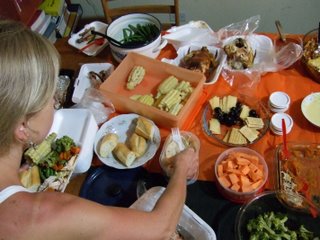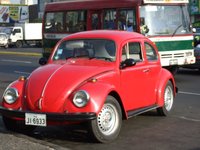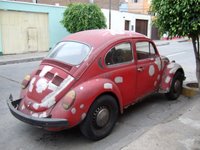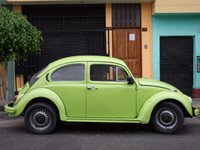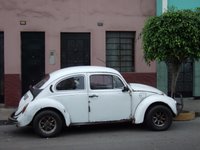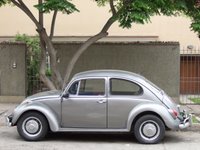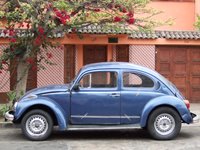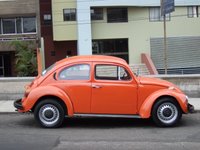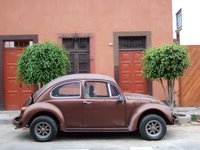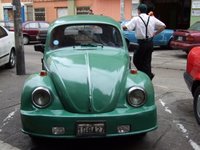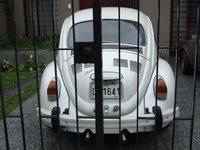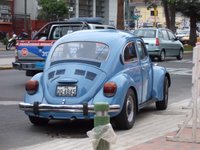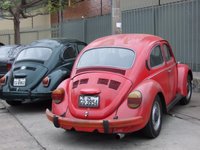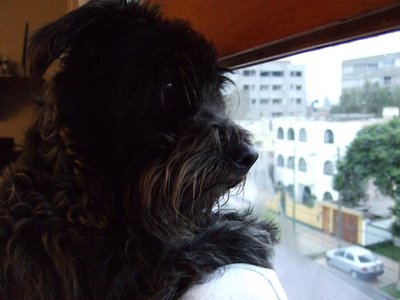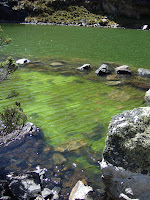21 December 2006
familiar faces
Friends from the States arrived in Lima last night. Carlos and I meet them at their hotel at midnight, toured their apartment for a room, had a drink, and parted at 2. Already we're adjusting them to the party schedule in Perú.
20 December 2006
house
I can't wait for Carlos to arrive.
We bought the first and second seasons of House, M.D. and are addicted to watching it. I suppose I could watch it without him, but that wouldn't be very nice. Then again, Carlos has always claimed that I'm not very nice to him; so I could use this opportunity to prove him right. He would like being right. Right?
We bought the first and second seasons of House, M.D. and are addicted to watching it. I suppose I could watch it without him, but that wouldn't be very nice. Then again, Carlos has always claimed that I'm not very nice to him; so I could use this opportunity to prove him right. He would like being right. Right?
19 December 2006
that way
Trying to obtain precise directions in Lima is to feel like blood is spurting from your eyes and ears. The only fruit pluckable from such an exercise is ripe vexation.
One day, Carlos asked a man where the bus stop was. The unhelpful man motioned behind him, said "that way," and took off. I thought, What the fuck! The entire fucking city of Lima is fucking "that way." Grrr...
One day, Carlos asked a man where the bus stop was. The unhelpful man motioned behind him, said "that way," and took off. I thought, What the fuck! The entire fucking city of Lima is fucking "that way." Grrr...
18 December 2006
week of loss
My phone was stolen.
My sunglasses fell and broke when I launched a surprise hug attack against a boy in Carabayllo.
My silver earring in the shape of a turtle probably washed down the drain in the shower.
Losing my earring reminded me how, years ago, I had lost the other turtle in the pair. Even as I endeavored to sever hopeless attachments, old associations surfaced like churned sedimentary rocks.
That can be nice, like looking at photographs, the ghosts of a finite instant.
Time, faithfully flowing forward, will carry more important things and people away from me in its current. Floating toward and away from each other at differentiated rates, we live in a perpetual progress of loss, losing each other and inevitably ourselves, though, all in our own good time.
My sunglasses fell and broke when I launched a surprise hug attack against a boy in Carabayllo.
My silver earring in the shape of a turtle probably washed down the drain in the shower.
Losing my earring reminded me how, years ago, I had lost the other turtle in the pair. Even as I endeavored to sever hopeless attachments, old associations surfaced like churned sedimentary rocks.
That can be nice, like looking at photographs, the ghosts of a finite instant.
Time, faithfully flowing forward, will carry more important things and people away from me in its current. Floating toward and away from each other at differentiated rates, we live in a perpetual progress of loss, losing each other and inevitably ourselves, though, all in our own good time.
17 December 2006
16 December 2006
thousand cranes
There was a Christmas party for the children in Carabayllo and I was invited to help and participate.
There were activities like crafts and face painting, and there was entertainment in the form of two clowns, one Barney the Dinosaur, and one tripped-out Mickey Mouse.
I taught origami to 20 or 30 kids, of all ages and skill levels. Just when I was halfway through a lesson, two or three kids would show up late and ask to be taught. And just as I got them caught up, a few more stragglers would show up and beg to be taught, too. For four hours, I demonstrated how to make paper cranes and couldn't move on to anything else.
For the first time, I truly appreciated Carlos's challenge to teach these kids. And, for the last time will I make anymore paper cranes.
There were activities like crafts and face painting, and there was entertainment in the form of two clowns, one Barney the Dinosaur, and one tripped-out Mickey Mouse.
I taught origami to 20 or 30 kids, of all ages and skill levels. Just when I was halfway through a lesson, two or three kids would show up late and ask to be taught. And just as I got them caught up, a few more stragglers would show up and beg to be taught, too. For four hours, I demonstrated how to make paper cranes and couldn't move on to anything else.
For the first time, I truly appreciated Carlos's challenge to teach these kids. And, for the last time will I make anymore paper cranes.
15 December 2006
ají relleno de quinoa
 I made these.
I made these.They are ají stuffed with quinoa. Ají with their seeds and veins can kill you; without, they are mild and sweet. Quinoa is an ancient grain more potent in protein than tofu; in this context, they have the texture of steamed cuttlefish eggs.
It took me 1.5 hours to unseed and devein 16 of these suckers and 15 minutes to stuff them. (Therein lies the reason the rounder, apple-shaped rocoto is more popular for stuffing.)
14 December 2006
here's my phone, take my money, too
The morning after my phone was stolen, I went to the police station to file a report. The policeman took my information, but before the report could be official, I would need to go to the Banco de la Nación and purchase a voucher of sorts. (I guess if you can't punish the thief, might as well fine the victim for being careless.)
I finally found a branch and there were two lines that stretched out the door. I estimated a 2-hour wait to purchase something that I will then need to bring back to the police station in order to claim that I've been robbed, officially. Needless to say, I didn't wait. I decided there was no hurry and could return another day since the police didn't seem to be in a rush to find my phone either.
I finally found a branch and there were two lines that stretched out the door. I estimated a 2-hour wait to purchase something that I will then need to bring back to the police station in order to claim that I've been robbed, officially. Needless to say, I didn't wait. I decided there was no hurry and could return another day since the police didn't seem to be in a rush to find my phone either.
13 December 2006
revolutionaries
Carlos and I attempted to go to a lecture at the National Library.
There was a coloquio on Victor Humareda, an influential artist who shaped modern Peruvian painting by veering from and changing its historical direction. It has been 20 years since his death and the National Library organized an exhibit of his paintings and drawings, photo portraits by various photographers, and panel discussions on Humareda's œuvre and impact.
We arrived early to tour the exhibit and seated ourselves in the auditorium a few minutes before 19:00, when the discussion was scheduled to begin.
Five minutes past, the auditorium was still mostly empty and the stage and guest chairs were completely vacant. Ten minutes later, 15, 20, 25, nothing, not even an announcement. Finally at 19:30, the auditorium now mostly full but still no guests, we inquired when the talk would begin. The usher said "in five minutes." We left. We didn't arrive in Peru yesterday and recognized the hackneyed euphemism.
I was surprised that no one else seemed angry, or at least a little bit annoyed. I wished that the audience members were wise to value their time and demand better for themselves. But then that would require them to be revolutionaries, too.
There was a coloquio on Victor Humareda, an influential artist who shaped modern Peruvian painting by veering from and changing its historical direction. It has been 20 years since his death and the National Library organized an exhibit of his paintings and drawings, photo portraits by various photographers, and panel discussions on Humareda's œuvre and impact.
We arrived early to tour the exhibit and seated ourselves in the auditorium a few minutes before 19:00, when the discussion was scheduled to begin.
Five minutes past, the auditorium was still mostly empty and the stage and guest chairs were completely vacant. Ten minutes later, 15, 20, 25, nothing, not even an announcement. Finally at 19:30, the auditorium now mostly full but still no guests, we inquired when the talk would begin. The usher said "in five minutes." We left. We didn't arrive in Peru yesterday and recognized the hackneyed euphemism.
I was surprised that no one else seemed angry, or at least a little bit annoyed. I wished that the audience members were wise to value their time and demand better for themselves. But then that would require them to be revolutionaries, too.
12 December 2006
purloined phone
I was rushed, my guard was down, the bus was crowded. Someone reached into my bag and took my phone. I am angry not only because the thief violated my personal space, but took something that he did not earn.
Moreover, my phone has a security lock on it. If he ever turns it off and on again, he will not be able to use it without the password. Pyrrhic victory for me, but I am not satisfied.
Moreover, my phone has a security lock on it. If he ever turns it off and on again, he will not be able to use it without the password. Pyrrhic victory for me, but I am not satisfied.
11 December 2006
mini shake
Another earthquake. Just before 17:00. This one lasted under 10 seconds. It's amazing how loud these things are.
10 December 2006
industrious idling
After an activity-filled week, Carlos and I wanted to take it easy on Sunday.
We woke up at 9. A friend came over and I taught Carlos and our friend yoga on the roof of my apartment. Afterward, we brunched at a yummy cevicheria, desserted on creamy gelato, walked to the beach, chatted with friends who had just finished surfing, watched Volver, snuck in to see the last, terrible, 30 minutes of Happy Feet, and ate tamales and fruit for dinner with wine.
Even though we had fun, it still felt like hard work.
We woke up at 9. A friend came over and I taught Carlos and our friend yoga on the roof of my apartment. Afterward, we brunched at a yummy cevicheria, desserted on creamy gelato, walked to the beach, chatted with friends who had just finished surfing, watched Volver, snuck in to see the last, terrible, 30 minutes of Happy Feet, and ate tamales and fruit for dinner with wine.
Even though we had fun, it still felt like hard work.
09 December 2006
no woman no cry
08 December 2006
caral
 We took a day trip to Caral, "La Civilización Más Antigua de América." It is located about 115 miles north of Lima, situated 15 miles inland from the desert coast of Perú, in a valley of barren mountains.
We took a day trip to Caral, "La Civilización Más Antigua de América." It is located about 115 miles north of Lima, situated 15 miles inland from the desert coast of Perú, in a valley of barren mountains.Settled about 5,000 years ago, Caral's pyramids and mummies are contemporary with those in Egypt. According to our guide, researchers believe the city was meticulously planned (versus organically blossomed), which suggests a ritual function. (Think New York City and Washington, D.C. New York happened because people came. Washington, D.C. was deliberately architected to fulfill a specific function.) The inhabitants of Caral performed many ceremonies as well as traded with neighbors from the coast and jungle.
Being on the site and imaging specters walking to and fro, trading, aching, and laughing was surreal. Aside from the idea of something impressive, the sight of monochromatic dirt, rock, and sky did not fill me with cheer.
07 December 2006
sounds of summer
I am frequently reminded that summer is fast approaching by the din of ducks dying the most horrible death imaginable.
Mind you, I'm not talking about their actual demise, but the sound of moribund mallards. If one were to deconstruct the cacaphony, the individual parts would incorporate aspects of quack, whack, beep, yack, and mack.
It turns out that mallards are not being maltreated. It is the whistle of the ice cream man. Go figure. It almost makes me want to sponsor a contest with the challenge to list one reason why the dying duck whistle is a good business strategy. Just one reason. One.
Mind you, I'm not talking about their actual demise, but the sound of moribund mallards. If one were to deconstruct the cacaphony, the individual parts would incorporate aspects of quack, whack, beep, yack, and mack.
It turns out that mallards are not being maltreated. It is the whistle of the ice cream man. Go figure. It almost makes me want to sponsor a contest with the challenge to list one reason why the dying duck whistle is a good business strategy. Just one reason. One.
06 December 2006
p d a
I encountered a large park today. Ample quantities of green grass and benches encircled a gigantic, gaudy memorial to "Confraternity" and "Victory."
Even more torturous to the senses was the throng of lovers—whether entwined or piled one atop the other—violently swapping spit. They were like garden gnomes going about their sinister business and I very much wanted to do as Mrs. Weasley does and pull them up by their hair and toss them far and away, hopefully, into oncoming traffic.
Even more torturous to the senses was the throng of lovers—whether entwined or piled one atop the other—violently swapping spit. They were like garden gnomes going about their sinister business and I very much wanted to do as Mrs. Weasley does and pull them up by their hair and toss them far and away, hopefully, into oncoming traffic.
05 December 2006
of oranges and evian
Combis are pretty dirty vehicles and public eating is generally a faux pas. But I love it when passengers squirrel in the back of combis and eat oranges. When they peel the fruit, the spray of oils in the peel infuse the air with sweet spicy aromas. I feel like a Make-up Lady at Macy's just spritzed Evian mist in the air and asked me to walk into the cloud of cool detoxifying purity.
04 December 2006
océanos y pye de limón

On Sunday I went to a mesmerizing photo exhibit of marine animals and afterward ate sublime lime-pie flavored gelato.
In the warm sun, under a blue sky, breathing in fresh air, on that most perfect spring day, I watched marathon runners sweat past me, including a blind runner and his guide, and thought, I like living in Lima.
03 December 2006
pollada y maracuya sour
Yesterday morning, I bought a pollada for s/ 6 ($2). A pollada is a dish that consists of chicken, potato (of course), and salad. It is the typical way to fundraise in poor communities. My donation will fund an operation to remove a breast tumor in a 20-year-old woman.
Yesterday night, I went to a posh bar to celebrate the birthday of a new acquaintance. I spent s/ 70 ($23) for exotic drinks and fancy sounding appetizers.
Yesterday night, I went to a posh bar to celebrate the birthday of a new acquaintance. I spent s/ 70 ($23) for exotic drinks and fancy sounding appetizers.
02 December 2006
my cat fix
I taught a yoga class today and was well rewarded. Not only did my students teach me how to become a better teacher, but there was a cat!
The cat lived in the house where we held the class. Finally, a cat I can catch and pet. A cat I could molest while my students reposed in Savasana.
Most people in Lima have dogs. Don't get me wrong, I love dogs, too. In fact, this paragraph is entirely devoted to the subject of "dog."
So anyway, back to my point... There's something about being able to roll a cat around, pull it by its little paws and drag it across the floor, swoop it up in the air and throw it around like a furry rag, watch it run away and back, and do your darnest to swat it away and have its purring little mug pressing back, insisting to be scratched.
Ahhh... I feel better already.
The cat lived in the house where we held the class. Finally, a cat I can catch and pet. A cat I could molest while my students reposed in Savasana.
Most people in Lima have dogs. Don't get me wrong, I love dogs, too. In fact, this paragraph is entirely devoted to the subject of "dog."
So anyway, back to my point... There's something about being able to roll a cat around, pull it by its little paws and drag it across the floor, swoop it up in the air and throw it around like a furry rag, watch it run away and back, and do your darnest to swat it away and have its purring little mug pressing back, insisting to be scratched.
Ahhh... I feel better already.
01 December 2006
comings and goings
One of my roommates is moving out on Monday. I will miss him. I've already decided not to like the new person. But that's just me being me. I didn't think I would like my current roommates and the opposite is true.
30 November 2006
botero
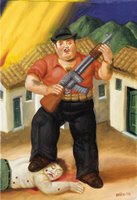 Fernando Botero is one of my favorite artists in the world, possibly of all time. My heart leaped two miles high when I learned there was an exhibit of his work in Lima, and rushed to it.
Fernando Botero is one of my favorite artists in the world, possibly of all time. My heart leaped two miles high when I learned there was an exhibit of his work in Lima, and rushed to it.The exhibit is called "El Dolor de Colombia" and features paintings and drawings that depict violence. There is much to be said about the subject matter of the works. With titles like "Massacre," "Kidnapping," and "Woman Crying," the moral intension and emotional intensity behind this show did not escape me.
Yet, to expose myself to be the sybarite that I am, I was absolutely mesmerized by the man's art. The lines, shades, and textures of the paints and graphite hit me as hard as the bullets that pierced his imaginary subjects. When Botero used a pencil to draw the fine lines of a woman's hair, I wondered what note would sound if I were to pluck one of the metallic strands of graphite.
Come visit me and see Botero.
29 November 2006
28 November 2006
choclo, huevo, y papa
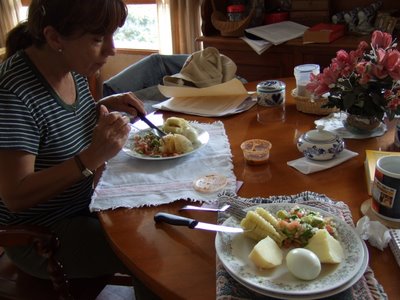 Elizabeth, my landlady, is lovely. Sometimes, she makes me lunch. Today, she served a typical Peruvian dish, which is simply boiled corn, egg, and potato. It usually comes with huacatay (a cheese-based sauce) and/or rocoto (a heat-packed red pepper-based sauce).
Elizabeth, my landlady, is lovely. Sometimes, she makes me lunch. Today, she served a typical Peruvian dish, which is simply boiled corn, egg, and potato. It usually comes with huacatay (a cheese-based sauce) and/or rocoto (a heat-packed red pepper-based sauce).I love its unadorned presentation, familiar flavors, and satisfying textures. This kind of food takes me home to China, to the States, and has a way of rooting me down, making Peru home, too.
27 November 2006
connections
A new acquaintance in Lima, who Carlos was introduced to by his friend in the States, knows my roommate, who found her room through craigslist like me. This leads me to hypothesize that at least one of the five of us must know Kevin Bacon, the sixth degree.
26 November 2006
volunteer thanksgiving
Carlos and his roommates invited their Peruvian friends and colleagues to celebrate Thanksgiving on Sunday. The Fantastic Four created an incredible feast with green bean casserole, candied yams (brushed with orange-infused vodka), stuffing (vegan and meat-juice flavored), and two pies (pecan and apple). And of course, the turkey, which was juicy and flavorful; the turkey team met their formidible challenge to defrost, brine, and roast a 15 lbs. bird in 21 hours.
25 November 2006
injured bird, dead worm
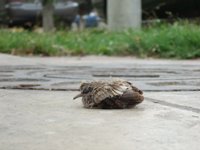
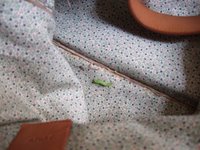 I encountered this injured birdie on my way home from the farmer's market. It hobbled away when I tried to pick it up. It didn't want my help.
I encountered this injured birdie on my way home from the farmer's market. It hobbled away when I tried to pick it up. It didn't want my help.This worm I found when I took fresh oregano from my bag. It was already dead and couldn't use my help.
Both animals filled me with anxiousness, disgust, and pity. But, I think the worm was easier to reconcile because I know it's decomposing in the garbage can. The bird? Who knows.
24 November 2006
thanksgiving potluck
23 November 2006
thanksgiving hotpot
Thanksgiving is my day to reign in my father's kitchen.
My dad cooks for our family and he is the reason that I don't know how to cook Chinese food. He is fantastic, but is so self-sufficient and efficient that the biggest help I can give him in the kitchen is to stay out of it.
For 19 years, our dinner on Thanksgiving resembled a meal served on any other day. Occasionally, my dad would prepare a dried, salted turkey part (don't know which part since it's usually cut up). Delicious with rice, but not exactly traditional.
The past two Thanksgivings, I've taken over my dad's kitchen. I have roasted the turkey, mashed the potatoes, and buttered the corn and he can't do anything except watch because he doesn't know anything about ovens (the Chinese think ovens are a handy place to store pots and pans).
My nieces and nephews love it. The little gluttons love the food, but I think they also love how celebrating a traditional Thanksgiving validates them as Americans. (Well, let me not speak for them. That's how I have felt growing up eating salted turkey on Thanksgiving.) When you eat turkey on Thanksgiving, you've made it. There's nothing Chinese about a gigantic, whole bird in the middle of the table, not sliced up, not stir-fried, not in soup.
I suppose I shouldn't have been surprised when my mom told me that they wouldn't be roasting a turkey this year for Thanksgiving because I was the only one who knew how to do it. Instead, they're having hotpot.
And I confess, as much as I love the traditional Thanksgiving fare, I miss home, I miss my dad's cooking, and I wish I was eating hotpot for Thanksgiving, too.
My dad cooks for our family and he is the reason that I don't know how to cook Chinese food. He is fantastic, but is so self-sufficient and efficient that the biggest help I can give him in the kitchen is to stay out of it.
For 19 years, our dinner on Thanksgiving resembled a meal served on any other day. Occasionally, my dad would prepare a dried, salted turkey part (don't know which part since it's usually cut up). Delicious with rice, but not exactly traditional.
The past two Thanksgivings, I've taken over my dad's kitchen. I have roasted the turkey, mashed the potatoes, and buttered the corn and he can't do anything except watch because he doesn't know anything about ovens (the Chinese think ovens are a handy place to store pots and pans).
My nieces and nephews love it. The little gluttons love the food, but I think they also love how celebrating a traditional Thanksgiving validates them as Americans. (Well, let me not speak for them. That's how I have felt growing up eating salted turkey on Thanksgiving.) When you eat turkey on Thanksgiving, you've made it. There's nothing Chinese about a gigantic, whole bird in the middle of the table, not sliced up, not stir-fried, not in soup.
I suppose I shouldn't have been surprised when my mom told me that they wouldn't be roasting a turkey this year for Thanksgiving because I was the only one who knew how to do it. Instead, they're having hotpot.
And I confess, as much as I love the traditional Thanksgiving fare, I miss home, I miss my dad's cooking, and I wish I was eating hotpot for Thanksgiving, too.
22 November 2006
one loop, two loops
Carlos and I didn't run 10k last Sunday as we had promised ourselves. However, we have managed to run 3k and 6k on Monday and Wednesday, respectively. I guess that adds up to almost 10k. Just thought you would like an update.
21 November 2006
20 November 2006
china
The men in Lima like to call out "china" when I walk by as if they've never seen one and as if Perú didn't have the largest population of Chinese in Latin America. But, china could also mean "girl," equivalent to chica. I don't understand why the men do that here because I already know that I'm a girl. Then again, whenever I pass by a cat (or dog), I like to point and say "cat!" (or "dog!").
19 November 2006
dust filtered sunset
On this election day, Carlos and I visited Carabayllo, the community in which he works.
We climbed a mountain of rock and dirt. On the way up, there was a road division with flowers, plants, and trees, which proved to me that green things can grow here.
Carlos introduced me to his kids. They were all strikingly beautiful and filthy. They were shy and aggressively curious at once.
On the mountain, we watched the sun set behind dust and clouds.
We climbed a mountain of rock and dirt. On the way up, there was a road division with flowers, plants, and trees, which proved to me that green things can grow here.
Carlos introduced me to his kids. They were all strikingly beautiful and filthy. They were shy and aggressively curious at once.
On the mountain, we watched the sun set behind dust and clouds.
18 November 2006
vote, or else
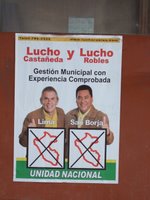 Election day is tomorrow.
Election day is tomorrow.Even though I don't watch T.V., I've been exposed to a hearty dose of political advertisements. There are banners with candidate faces on most every road, signpost, billboard, food cart.
Do any of you remember Crazy Eddie? He used to hawk electronics on television and talked really, really fast? The dude on the left (the current mayor of Lima) reminds me of him. I think it's the thumbs-up gesture that triggered the association.
Honestly, most of the headshots are not flattering. The candidates look like they're trying to sell real estate. The photo quality is that bad. There's one guy who had crooked teeth and may have been cross-eyed. There's nothing wrong with having those features, but if your face is plastered on a 20-foot banner, having a photo taken at an unflattering angle can be particularly distracting from your message (I believe, anyway).
Another man, and I'm not exaggerating, looks like grandpa from "The Munsters." And because his banner is 20 feet tall, you can see the cooper-green eye shadow he is wearing. (He is also caked in chalk-white foundation, which makes him look singularly dracula-esque against the blood-red background of his poster.)
I planned on discussing some of the voting regulations, but Jen, my roommate, has already written an excellent post on the topic.
17 November 2006
combi hustlers
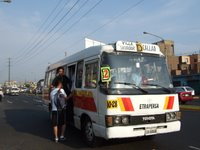 Public transportation in Lima is comprised of a system of jitneys. Cheap, convenient, flexible, fast, polluted, polluting, they're called combis (combi singular).
Public transportation in Lima is comprised of a system of jitneys. Cheap, convenient, flexible, fast, polluted, polluting, they're called combis (combi singular).There is a driver who navigates the tangle of traffic and a "hustler" who ushers passengers on and off the buses.
It is the job of the hustler to hang out precariously from the doorway of the bus and call out the routes. Most of the time, the man makes his announcements and the bus drives on.
Every now and then (not all of the time, but frequent enough to prompt me to author a post about this), the hustler will look you in the eye, beckon you with energetic hand motions, and implore you to board the bus. Whether your destinations are congruent is academic.
It's as if you were strolling past 42nd Street and Lexington Avenue in New York City and an airport shuttle to JFK slowed down and the driver begged you to hop on board. "Come on. JFK. JFK! That's right, we're going to JFK and you should, too. You know you want to go there. It's JFK."
I always feel a twinge of guilt when I shake my head "no." I don't know why, but I feel like I'm letting them down somehow.
16 November 2006
mirando sin ver
I have been looking all over for the Delete key on my new keyboard. Looking and looking, and not finding; I decided that the stupid designers neglected or chose not to include it. Then, finally, I saw it. Guess where? Guess! Right next to the Back Space key (which I have been using constantly). And it's a pretty big key, twice the size it is on standard keyboards. Boy, I feel stupid. And I should feel stupid because I decided the key didn't exist only because I couldn't find it where I expected it to be.
15 November 2006
habits
After intensively posting for the past few days, my fingers were sore from the typing. So I finally decided to take my fancy schmancy ergonomic keyboard out of the closet.
I'm used to typing on split keyboards, but this is a different beast. This keyboard has two cups, one for each hand. The keys are spaced a bit differently and placed in a slightly different order; also the touch is much more sensitive (so I won't have to press as hard).
It feels so weird. Having been typing since the ninth grade, the keyboard is like an extension of my body. Now, everything's changed and I'm not sure I like it. My muscles and nervous connections are confused and hesitant. I spend more time correcting mistakes than producing.
But, I will admit that my hands feel so much better. The pain and tension in my digits and wrists have significantly subsided. By being flexible and assiduous, my typing is becoming more fluent.
Hopefully, I'll be able to apply this lesson to learning Spanish. It's a crazy beautiful language. There are so many things I love about it, like how it forces me to be precise about diction. However, often I grow angry and indignant at the scores of tenses and conjugations. Why?! But then, sometimes "why" is not the point. "How?" is the question I must persist in asking myself.
I'm used to typing on split keyboards, but this is a different beast. This keyboard has two cups, one for each hand. The keys are spaced a bit differently and placed in a slightly different order; also the touch is much more sensitive (so I won't have to press as hard).
It feels so weird. Having been typing since the ninth grade, the keyboard is like an extension of my body. Now, everything's changed and I'm not sure I like it. My muscles and nervous connections are confused and hesitant. I spend more time correcting mistakes than producing.
But, I will admit that my hands feel so much better. The pain and tension in my digits and wrists have significantly subsided. By being flexible and assiduous, my typing is becoming more fluent.
Hopefully, I'll be able to apply this lesson to learning Spanish. It's a crazy beautiful language. There are so many things I love about it, like how it forces me to be precise about diction. However, often I grow angry and indignant at the scores of tenses and conjugations. Why?! But then, sometimes "why" is not the point. "How?" is the question I must persist in asking myself.
14 November 2006
a mosquito's knees

Even though I didn’t have an opportunity to travel around Venezuela, I had a wonderful time with Carlos’s family.
Gabriela, Carlos’s aunt, speaks with a beautiful, clear Colombian accent. She is an impressive lady. In the mid-80s, when her husband’s health failed, her husband’s business partner cheated and left them with nothing but debts.
The family was forced to move out of their comfortable home into an apartment half the size. Meanwhile, Venezuela’s economy also tanked. With a husband at home who was slowly dying of Parkinson’s disease, Gabriela single-handedly provided for her three sons and ailing husband.
It has been over ten years since her husband passed away, and she is still very much in love with him. Now, she suffers from herniated discs in her lower back and works when she can as a coiffeur. I liked her stories about rich women who try to bargain for 90% discounts on her fastidious services.
Carlos’s uncle, Gustavo, is also a hoot. When we crossed streets, he liked to say, “This is more dangerous than a bullet in the ear.” Also, when someone was skinny, he would comment, “A mosquito has more fat on its knees.”
13 November 2006
one cloud
I told Elizabeth, my landlady, about the magical clouds in Caracas. In her cheerfully sardonic way, she remarked that in Lima we can feel distinguished too because we are blessed with one very special gray cloud that spreads itself over the entire city.
12 November 2006
10k
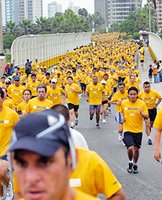 Completely ill-prepared, Carlos and I participated in a 10k race with about 8,500 other people through the streets of downtown Lima. (My first race ever!) The race was sponsored by Nike and took place in nine cities across Latin America. (Source 1, 2, 3)
Completely ill-prepared, Carlos and I participated in a 10k race with about 8,500 other people through the streets of downtown Lima. (My first race ever!) The race was sponsored by Nike and took place in nine cities across Latin America. (Source 1, 2, 3)We finished strong, in 1h 16m, and had a fantastic time. The weather was cool, volunteer musicians spurred us on, and, for once, our right of way as pedestrians was enforced. I gloated as I watched cars line up, waiting for their turn to cross.
Afterwards, Carlos and I were poopered. We spent the remainder of the day resting and napping. At 16:00, we headed out for a ceviche dinner and caught a movie called Samaritan Girl by South Korean director Kim Ki-Duk, which filled our heads with images of violent love and death (a recurring theme in Korean movies I've noticed).
Inspired by today's run, I've made Carlos promise to run a 10k with me every Sunday. We will see how consistently we work to realize this vow.
11 November 2006
caracas
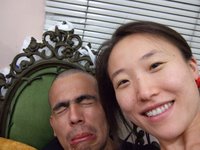 I descended upon Caracas at night. As our plane approached the landing strip, we flew over apartment towers lit up like architecture models; to my left was the silhouette of the sea; to my right were shadows pressed against the sky that turned out to be mountains.
I descended upon Caracas at night. As our plane approached the landing strip, we flew over apartment towers lit up like architecture models; to my left was the silhouette of the sea; to my right were shadows pressed against the sky that turned out to be mountains.I came to Venezuela to attend the wedding of Ramón, Carlos’s cousin. Carlos was born in Caracas and spent his first 11 years here; Ramón was more like a brother than cousin. I had also hoped to travel around a bit since Angel Falls, the world’s tallest cataract, was here and a poster at the airport, which proclaimed Venezuela to be the Caribbean’s best-kept secret, piqued my interest (and as it turned out, it will remain a well-guarded secret to me).
The drive from the airport (just outside city-limits) into Caracas, with tall mountains and windy roads, recalled memories of San Francisco. Carlos’s cousins, Ramón and Angel, were sure I would revise my opinion in better light. They were right.
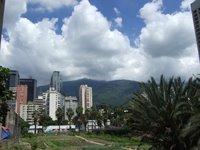 On the one hand, Caracas was spectacular. The city was nestled in a valley. Turn in any direction and you will encounter enormous mountains. Not just a pretty view, these mountains imposed their full magnificence and magnitude. To see them was to feel a punch in the gut; they were painfully and violently beautiful. I felt like I had fallen into a deep, wide well. And when I looked up, the sky and the clouds were always always the bluest blue and the whitest white. Despite the pollution, the firmament was sempiternally flawless.
On the one hand, Caracas was spectacular. The city was nestled in a valley. Turn in any direction and you will encounter enormous mountains. Not just a pretty view, these mountains imposed their full magnificence and magnitude. To see them was to feel a punch in the gut; they were painfully and violently beautiful. I felt like I had fallen into a deep, wide well. And when I looked up, the sky and the clouds were always always the bluest blue and the whitest white. Despite the pollution, the firmament was sempiternally flawless.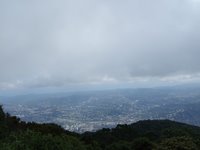 Unfortunately, when I looked down, at the ground beneath my feet, all I saw was dirt and trash. What nature bequeathed, a jewel wrapped in verdant, fragrant mountains and capped with cobalt and milk sky, the citizens of Venezuela had gorged and transmuted with the foul bile in their foul bowels, farting petrol that stings the eyes red and blind, excreting litter that contaminates the spirit senseless. There should be a sign to curb the citizens of the waste of their cheap industry and purge their diseased arteries infected with filth and fear.
Unfortunately, when I looked down, at the ground beneath my feet, all I saw was dirt and trash. What nature bequeathed, a jewel wrapped in verdant, fragrant mountains and capped with cobalt and milk sky, the citizens of Venezuela had gorged and transmuted with the foul bile in their foul bowels, farting petrol that stings the eyes red and blind, excreting litter that contaminates the spirit senseless. There should be a sign to curb the citizens of the waste of their cheap industry and purge their diseased arteries infected with filth and fear.On December 3, Venezuelans will vote. Watching Hugo Chavez campaign for reelection was like watching a rock star. Women swooned and men screamed in his presence. Hugo was very talented. He carried passion in his voice when he spoke about socialism and fomented nationalism.
One of Chavez’s campaign slogans was “Vote against the Devil. Vote against imperialism.” Despite the rhetoric, there were more McDonald’s and Burger King franchises per square mile in Caracas than Starbucks’s in Manhattan.
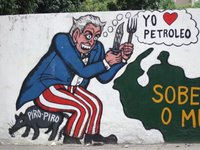 Tourism had not been well developed in Venezuela because it was perceived as another way for wealthy foreigners to exploit the country. That was why I didn’t travel outside of Caracas. A 2-night, 1.5-day trip to the mountains (including only breakfast, transportation to and from the airport, and one tour) cost $550. To backpack as a single female was strongly discouraged because of safety issues.
Tourism had not been well developed in Venezuela because it was perceived as another way for wealthy foreigners to exploit the country. That was why I didn’t travel outside of Caracas. A 2-night, 1.5-day trip to the mountains (including only breakfast, transportation to and from the airport, and one tour) cost $550. To backpack as a single female was strongly discouraged because of safety issues.Security was a tangible absence in Caracas and a source of anxiety that permeated every aspect of routine: driving, walking, entering a home, snapping a picture…
Some examples:
- A red light at an intersection (when there were lights at all) served only as a friendly reminder. I was told that there were no speed limits on the highways and no laws governing drinking and driving.
- After 21:00, the streets were deserted. My hosts constantly watched over their shoulders, vigilant against drunkards, thieves, and car-jackers.
- To enter or leave a residence, it was typically necessary to bypass a minimum of five locks. There was at least one main gate (sometimes two or three), one gate in front of the door to the apartment, and at least two locks (usually three or four) on the main door.
 When I took a picture of a demonstration in front of the presidential palace, a large, armed soldier approached me and threatened to confiscate my camera. Finally, I acquiesced by deleting the objectionable pictures in his presence. (However, after he left, I secretly took more photos.)
When I took a picture of a demonstration in front of the presidential palace, a large, armed soldier approached me and threatened to confiscate my camera. Finally, I acquiesced by deleting the objectionable pictures in his presence. (However, after he left, I secretly took more photos.)
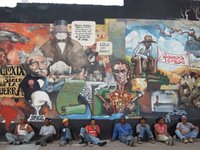 Yet, beneath the grime, dilapidation, and restrictions is unequivocal potential. Just look at the murals that line the city, created by artists of extraordinary talent. Like everywhere else I’ve visited in South America, the resources (natural and human) exist—in abundance. Nationalism as a palliative for poverty and suffering is inadequate. Pride is justified, but it must be followed up by positive works, constructive exploitation, scrupulous management, and moral leadership.
Yet, beneath the grime, dilapidation, and restrictions is unequivocal potential. Just look at the murals that line the city, created by artists of extraordinary talent. Like everywhere else I’ve visited in South America, the resources (natural and human) exist—in abundance. Nationalism as a palliative for poverty and suffering is inadequate. Pride is justified, but it must be followed up by positive works, constructive exploitation, scrupulous management, and moral leadership.Oh, and the wedding. It was a lovely, intimate gathering of family and friends. The ceremony was solemn and the party afterwards was rockin’.
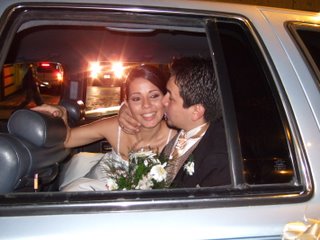
10 November 2006
panamá
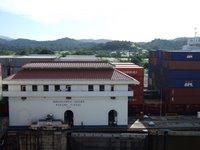 Rewind the clock three weeks back to Saturday, October 21. Carlos and I woke at 2:30 to head for the airport. He was flying to Bogotá, then Caracas; I to Panamá City, then Caracas.
Rewind the clock three weeks back to Saturday, October 21. Carlos and I woke at 2:30 to head for the airport. He was flying to Bogotá, then Caracas; I to Panamá City, then Caracas.I arrived in Panamá at 9:40. Immediately after deplaning, I was embraced by salty, humid air and fierce, equatorial sun. In the distance were blue skies and dense clouds anchored by low, lush mountains. Having always associated Panamá with the Canal and the Canal with modern engineering, traffic, and trade, I hardly anticipated this still, verdant vista.
My connecting flight wasn't until 19:20; I had almost ten hours to kill. So I paid for a tourist visa and signed up for a five-hour tour.
I hopped into a shiny, air-conditioned van and set off to explore Panamá City with about ten other tourists. Our guide began by describing the country's topography, the major indigenous tribes extant, and the prodigious variety of produce, including its coffee (among the best in world).
So our first stop in this fabulous, fertile land on this brief tour? Yes! A strip mall! Two hours for lunch and shopping at Conway, dollar stores, and "Indian Palaces" (as in East India) where I could find tablecloths, curtains, buttons, and much much more.
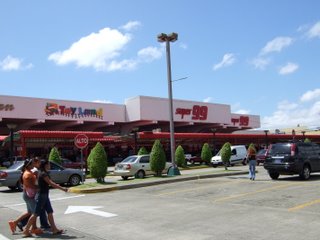
My first reaction was anger, as if someone had just picked my pockets. Then remembering my liberal education, I self-consciously wondered if I was just being a spoiled American. I began to rationalize that this was probably a more "genuine" experience; I was given a rare opportunity to "participate" in daily life as any regular Juan Schmoe would.
Based on the types of businesses I saw at the strip mall, I inferred that there was a large Chinese and Indian population present in Panamá. Likewise, American megacorporations, like McDonald’s, Burger King, and Domino’s Pizza, thrived.
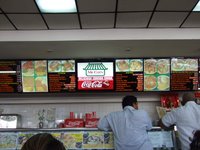 After a most horrible experience at a Chinese restaurant in Lima, I decided to try my luck in Panamá and ate lunch at Mr. Chen. The ambiance at Mr. Chen exuded…pizzeria. However, I was impressed that they had pushcart dim sum service.
After a most horrible experience at a Chinese restaurant in Lima, I decided to try my luck in Panamá and ate lunch at Mr. Chen. The ambiance at Mr. Chen exuded…pizzeria. However, I was impressed that they had pushcart dim sum service.I ordered wanton soup and dumpling dim sum. The dishes looked better than they tasted, but wasn’t entirely disappointing.
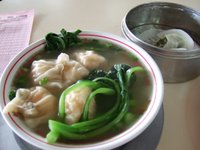 It was amusing to watch the waiters with their pushcarts queue in a corner. Whenever a customer arrived, ushered forward by the Chinese manager, they would display their offerings and quickly retreat to their stations in the corner. Unlike in New York, where the dance of the Cantonese ladies kept a steady stream of food flowing, these young Panamanian men were as awkward as pubescent boys at their first middle-school dance.
It was amusing to watch the waiters with their pushcarts queue in a corner. Whenever a customer arrived, ushered forward by the Chinese manager, they would display their offerings and quickly retreat to their stations in the corner. Unlike in New York, where the dance of the Cantonese ladies kept a steady stream of food flowing, these young Panamanian men were as awkward as pubescent boys at their first middle-school dance.Two hours later, we were off. Our next stop was the ruins of the original city built by the Spanish in 1519 and plundered and burned to the ground in 1671 by Welsh buccaneer (or pirate depending on your loyalties), Sir Henry Morgan. (Though, whether the blaze that destroyed the city was ignited by Morgan or the Spanish remains a matter for debate.)
Our van parked on the street and we disembarked for 5 minutes to snap pictures of the ruins. Part of the ruins were gated and marked with plaques like at a sculpture garden. Across the street were more scraps of history scattered across green fields where men played soccer and women walked their dogs.
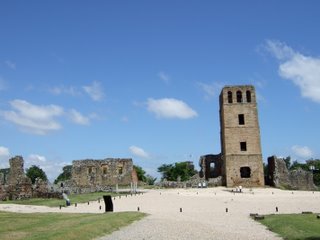
Back in our van, we cut across town and headed 8km southwest for Casco Viejo, the city built by the Spanish after Morgan’s attack. This was a sad sight to see.
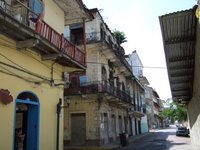 With the exception of very few houses and streets, most of Casco Viejo was decrepit, as if its citizens had cannibalized a still living man. While he was virile and had a twinkle in his eye, they sucked his fat from a cheap plastic straw, leaving his flesh and bones to rot in paradise.
With the exception of very few houses and streets, most of Casco Viejo was decrepit, as if its citizens had cannibalized a still living man. While he was virile and had a twinkle in his eye, they sucked his fat from a cheap plastic straw, leaving his flesh and bones to rot in paradise.This scene was made more absurd by the fact that the presidential mansion was located among this decay, separated from his neighbor—a crumbling edifice, more shell than home—by a narrow cobblestone street; the intimacy painful as a thorn pressing against raw flesh.
 This time, our tour guide granted us 10 minutes to explore. I stole 5 more when I encountered these beautiful girls and took their pictures. I apologized to my tour-mates for my tardiness and we headed for the coup-de-grâce: the Panamá Canal.
This time, our tour guide granted us 10 minutes to explore. I stole 5 more when I encountered these beautiful girls and took their pictures. I apologized to my tour-mates for my tardiness and we headed for the coup-de-grâce: the Panamá Canal.For whatever reason, I expected something more akin to the Hoover Dam. I thought the Canal would be very big, with massive concrete structures and steel thingamajigs. In reality, the Canal was rather quaint—to look at anyway.
The idea of severing two continents, the engineering feat that was executed, the sheer size of the ships that use the Canal were jaw-droppingly impressive.
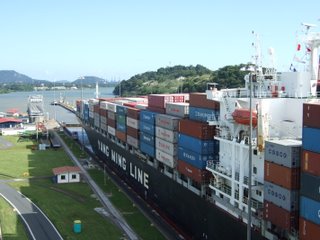
Some quick facts about the Canal:
- The project was begun by the French in 1890. Unequipped and unprepared for the tropical climate, they capitulated 14 years later to the mosquitoes (and disease and bankrupcy) and sold the development rights to the Americans for $25 million.
- Americans completed the project in 1914.
- About 27,500 people died from disease and accidents in the building of the Canal.
- The first ship to use the Canal was the Ancon, a steamboat.
- In 1928, Richard Halliburton took ten days to swim through the Canal and paid the lowest toll ever: $0.36.
- The most expensive toll, $249,165, was paid earlier this year by the Maersk Dellys.
- Currently, the average toll paid to cross the Canal is about $80,000 (the toll is calculated based on the weight and size of the vessel).
- About 38 vessels use the Canal each day. It takes about 8 hours to traverse the three locks of the Canal. During the day, traffic is Atlantic-bound; at night, it’s Pacific-or-bust.
- On Sunday, October 22, 2006, Panamanians voted to enlarge the Canal by adding a third lane. The project is estimated to take 7 years to complete and will cost $5 billion.
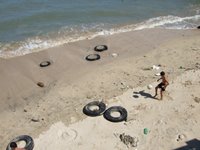 Like most of the South American countries I have visited, it seems to me that the wealth of Panamá is concentrated in the pockets of few. Despite the country's natural resources and the income generated by the Canal, extreme poverty resides alongside exceptional wealth.
Like most of the South American countries I have visited, it seems to me that the wealth of Panamá is concentrated in the pockets of few. Despite the country's natural resources and the income generated by the Canal, extreme poverty resides alongside exceptional wealth.In downtown Panamá, modern glass-and-steel luxury towers reach for pristine blue skies, while (literally) across the street there is a community of shacks founded and rooting deeper in contaminated mud.
From my brief visit, I have seen the beauty of the country in its breathtaking landscape and enchanting people. Yet, death and decadence dance like two dark clouds, waiting to crash and break.
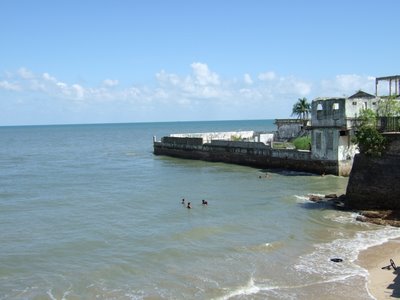
09 November 2006
he llegado
I arrived in Lima at 23:11 last night. My flights were pleasant and timely; an airport guard who assisted me with a question was exceptionally sweet. I was very happy to be back in Lima. I spent this morning settling back into a rhythm paused two and a half weeks ago. It is difficult getting started on this blogging business again. More tomorrow.
23 October 2006
p s a
It was my intention and ambition to publish at least one post each day. My plan has been foiled.
I am writing to you from a computer in Mail Boxes Etc. in a mall in Caracas, Venezuela, which is about a 30 minute cab ride from where I am staying.
The past two days I have been well-fed and well-loved by Carlos's family. I will spend 2.5 weeks in Venezuela to attend the wedding of Carlos's cousin and travel. When I return to Lima on 8 November, I hope to return to the regularly scheduled posting program.
Kisses to my dear readers.
I am writing to you from a computer in Mail Boxes Etc. in a mall in Caracas, Venezuela, which is about a 30 minute cab ride from where I am staying.
The past two days I have been well-fed and well-loved by Carlos's family. I will spend 2.5 weeks in Venezuela to attend the wedding of Carlos's cousin and travel. When I return to Lima on 8 November, I hope to return to the regularly scheduled posting program.
Kisses to my dear readers.
20 October 2006
seísmo
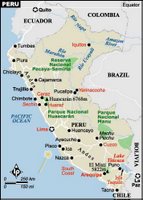 At 5:48, an earthquake registering 6.4 on the Richter scale emanated from Pisco, Perú.
At 5:48, an earthquake registering 6.4 on the Richter scale emanated from Pisco, Perú.My apartment building, room, and bed shook, but it was the car alarms outside that roused me. I lay in bed watching the ceiling lamp swing hypnotically, waiting for a hypnotist's voice to break through the gray dawn and the fog of my consciousness for instructions.
This is the biggest earthquake in Perú in 2006. There was no major damage and no reported injuries.
Have you ever picked up a rock from a lakeshore or beach? Felt its cool, dense weight? Then imagine entire mountains moving.
There is something awesome and formidable about being shaken and moved by, it seems, air—without the gross hold of hands, maws, or machines. Life is not limited to carbon-containing creatures, but extends to things like concrete and continental crust.
Wow.
I wanted to offer a sacrifice, build a temple, genuflect to the sun, moon, and stars; anything to hold on to mystery.
19 October 2006
angeles caidos
There is an independent theater nearby, El Cinematógrafo de Barranco. We saw Pasolini's The Gospels According to Saint Matthew on Sunday and Wong Kar Wai's Fallen Angels today.
I had forgotten that I'd already seen Fallen Angels. I still didn't understand it the second time around and I left once again satisfied.
I had forgotten that I'd already seen Fallen Angels. I still didn't understand it the second time around and I left once again satisfied.
18 October 2006
calling on god
I am working on essays for grants and graduate school applications. The questions are seemingly simple: tell us about yourself and your motivations for pursuing advanced study.
In my desperation for eloquence, I do little things that can only be classified under superstition: I drink hot theobroma cacao hoping to supernaturally stimulate my creative capacity. After a long day, I stand on my head in my room imagining amrita (nectar of immortality) flowing back into my corpus, revitalizing concentration and relieving achy muscles.
It's silly, I know. But that's what I did today.
In my desperation for eloquence, I do little things that can only be classified under superstition: I drink hot theobroma cacao hoping to supernaturally stimulate my creative capacity. After a long day, I stand on my head in my room imagining amrita (nectar of immortality) flowing back into my corpus, revitalizing concentration and relieving achy muscles.
It's silly, I know. But that's what I did today.
17 October 2006
milk in a bag
Milk here comes in a bag or a box and is really tasty. It reminds me of the milk from my childhood in China. The milk in the States tastes metallic to me.
China doesn't have a lot of cows because the landscape is mountainous and the farmable land is needed to grow food for people. Perhaps it is because of this rarity that made milk so expensive and such a treat when I was growing up.
I can still recall the glass bottles they were delivered in. And I still remember the time I snuck away a bottle of our neighbor's milk, drank it, and got caught by my parents. My parents were embarrassed and angry and made me confess my crime. Our neighbors were nice and offered me another glass to console my shame, which I drank.
China doesn't have a lot of cows because the landscape is mountainous and the farmable land is needed to grow food for people. Perhaps it is because of this rarity that made milk so expensive and such a treat when I was growing up.
I can still recall the glass bottles they were delivered in. And I still remember the time I snuck away a bottle of our neighbor's milk, drank it, and got caught by my parents. My parents were embarrassed and angry and made me confess my crime. Our neighbors were nice and offered me another glass to console my shame, which I drank.
16 October 2006
bubble head
I spent most of today reading one article in El Comercio (the local equivalent of The New York Times).
While it's a pain in the neck to have to thumb through a dictionary every other minute, I'm learning lots of new vocabulary and phrases. Too bad I don't have a photographic memory, which means there's still an echo when you rap on my skull, but at least my thumbs will be nicely toned.
Most of the time I feel like Frodo wading through the swamp of Dead Marshes. Every now and then I'll read a sentence and comprehend it immediately (in Spanish without having to translate it into English in my head). When this happens, I feel a sweet bubble float out of my clavicular notch (with rainbows and everything) and I brighten.
Little by little, I think I can make this work. I just have to be patient with myself and keep trudging.
While it's a pain in the neck to have to thumb through a dictionary every other minute, I'm learning lots of new vocabulary and phrases. Too bad I don't have a photographic memory, which means there's still an echo when you rap on my skull, but at least my thumbs will be nicely toned.
Most of the time I feel like Frodo wading through the swamp of Dead Marshes. Every now and then I'll read a sentence and comprehend it immediately (in Spanish without having to translate it into English in my head). When this happens, I feel a sweet bubble float out of my clavicular notch (with rainbows and everything) and I brighten.
Little by little, I think I can make this work. I just have to be patient with myself and keep trudging.
15 October 2006
mercado ecológico
There is a farmer's market in my neighborhood. It is small and makes me muy happy. For US$0.93, I bought one kilo of darling little sweet, red strawberries and for US$2.47, I bought a half-kilo of unbelievably creamy queso de cabra (goat cheese). I stocked up on spinach, beets, basil, bread, daikon, and granola made from quinoa.
14 October 2006
hiring: robots
Soon after I posted waxed and worn, I visited Carabayllo (where Carlos works) and learned that Carabayllo was nothing at all like Miraflores or Barranco (where middle–high income families live and play). The streets and homes in Carabayllo were not sophisticated and sensuous; they were shabby and sad. The air there was not salty and spry, but dusty and stale.
Yet, Carabayllo still felt vital. There were vendors and gente who were hawking, walking, and working.
Tuesday, on my way to a pricey café for lunch, a boy, as tall as my waist, tried to sell candies to me. Holding his left hand was his younger brother, who came to my knees; he was not older than 3. Both were filthy. The brothers still walked with a waddle; when they crossed busy intersections, I saw they were vulnerable and experienced.
Carlos said once, “Whoever invented jobs is mad. Jobs should be for robots.”
In some ways, I think that is what I am trying to do here—to use my privileged education, access, and affiliations so that my work will earn me more than just a buck.
I am not talking about “doing good.” I am speaking about “doing hard.”
For the Waddling Brothers, doing hard means selling candies and crossing mean streets.
For my parents, doing hard meant picking up their life in China and moving in their late-40s to a new country where they worked 6–7 days a week and 10–12 hours a day so their daughters could have better opportunities.
Doing a job is not the same as doing work. A job is a task, which can be easy or difficult, that does not require intellectual, emotional, or spiritual investment.
Whether rewarding or demoralizing, monotonous or dangerous, work is always difficult. With work, there is always something urgent, imperative, and burning at stake.
That is why charity is only “doing good” but effecting change is “doing hard.”
Yet, Carabayllo still felt vital. There were vendors and gente who were hawking, walking, and working.
Tuesday, on my way to a pricey café for lunch, a boy, as tall as my waist, tried to sell candies to me. Holding his left hand was his younger brother, who came to my knees; he was not older than 3. Both were filthy. The brothers still walked with a waddle; when they crossed busy intersections, I saw they were vulnerable and experienced.
Carlos said once, “Whoever invented jobs is mad. Jobs should be for robots.”
In some ways, I think that is what I am trying to do here—to use my privileged education, access, and affiliations so that my work will earn me more than just a buck.
I am not talking about “doing good.” I am speaking about “doing hard.”
For the Waddling Brothers, doing hard means selling candies and crossing mean streets.
For my parents, doing hard meant picking up their life in China and moving in their late-40s to a new country where they worked 6–7 days a week and 10–12 hours a day so their daughters could have better opportunities.
Doing a job is not the same as doing work. A job is a task, which can be easy or difficult, that does not require intellectual, emotional, or spiritual investment.
Whether rewarding or demoralizing, monotonous or dangerous, work is always difficult. With work, there is always something urgent, imperative, and burning at stake.
That is why charity is only “doing good” but effecting change is “doing hard.”
13 October 2006
squiggly streets
The past few days, I have been getting to know my neighborhood. The civil engineer charged with planning this city must have been a Dadaist. He created a labyrinth of squiggly streets that squiggle into each other at a million different places. Nevertheless, I finally feel (mostly) oriented and know the general direction to my destinations.
12 October 2006
sitting
As of yesterday, I have lived in Lima for 7/10854 of my life.
I am full of dammed-in nervous energy; I have so much to report (and do!). As I've told Valerie, I oftentimes feel that writing gets in the way of telling.
Really, I can't simply write everything. That would be idiotic. I must filter, distill, and narrate. I can't just show you tomatoes, garlic, basil, and olive oil. I have to give you sauce. And sauce takes time to prepare and simmer.
So bare with me, my dear friends, while I learn to sit into my new landscape, language, and life.
I am full of dammed-in nervous energy; I have so much to report (and do!). As I've told Valerie, I oftentimes feel that writing gets in the way of telling.
Really, I can't simply write everything. That would be idiotic. I must filter, distill, and narrate. I can't just show you tomatoes, garlic, basil, and olive oil. I have to give you sauce. And sauce takes time to prepare and simmer.
So bare with me, my dear friends, while I learn to sit into my new landscape, language, and life.
11 October 2006
lento
The stereotype is that in “warm-climate nations” (including Perú even though it has four seasons), things take time.
For many do-gooders with progressive sensibilities, rational outlooks, and efficient ideals, this slow speed of change is a source of endless frustration.
Yet, if you've ever been a passenger in a taxi or moonlighted as a pedestrian, you'll know that drivers in Lima are anything but lento.
I have been speaking in generalities. Let me offer you a more concrete example: Last Thursday I accompanied Carlos to the immigration ministry to extend his visa. We visited six stations in order to accomplish this task (1. request desk 2. application desk 3. back to request desk to submit his application 4. cashier counter 5. photocopy kiosk 6. request desk to show proof of payment and submit remaining paperwork). Each administrator at the various stations was professional and efficient. And, as you can see, the process was not.
Though a small inconvenience, the quality of life lay in the details.
I am still struggling to understand the mechanics behind this idea, phenomenon, and perception of "slow." However, having worked in a large American corporation, I do know that slow is not endemic to "developing nations."
Perhaps we have it backwards. Perhaps it is not the people who are slow, but those in power who impose slow on the population as a means of control; to reinforce inertia and maintain the status quo.
Who is to blame? What is to be done?
For many do-gooders with progressive sensibilities, rational outlooks, and efficient ideals, this slow speed of change is a source of endless frustration.
Yet, if you've ever been a passenger in a taxi or moonlighted as a pedestrian, you'll know that drivers in Lima are anything but lento.
I have been speaking in generalities. Let me offer you a more concrete example: Last Thursday I accompanied Carlos to the immigration ministry to extend his visa. We visited six stations in order to accomplish this task (1. request desk 2. application desk 3. back to request desk to submit his application 4. cashier counter 5. photocopy kiosk 6. request desk to show proof of payment and submit remaining paperwork). Each administrator at the various stations was professional and efficient. And, as you can see, the process was not.
Though a small inconvenience, the quality of life lay in the details.
I am still struggling to understand the mechanics behind this idea, phenomenon, and perception of "slow." However, having worked in a large American corporation, I do know that slow is not endemic to "developing nations."
Perhaps we have it backwards. Perhaps it is not the people who are slow, but those in power who impose slow on the population as a means of control; to reinforce inertia and maintain the status quo.
Who is to blame? What is to be done?
10 October 2006
¡a tu casa!
A little old lady yelled at me today.
She lives on the first floor of my apartment complex. There is a window to her apartment that faces the courtyard and has a mirror on one side, like those in police interrogation rooms one sees on Law & Order.
I did something I usually don't do, which is to fix my hair and make sure my clothes are not hanging crookedly on my shoulders.
Quite satisfied with myself, I took one last look. And just as I gave myself a goofy smile to say goodbye to the freshly primped me in the mirror, the little woman opened her window, pointed to my apartment above, and admonished, "¡A tu casa!"
Instantly I deflated. Flustered and mortified, I muttered an apology and escaped into the street.
She lives on the first floor of my apartment complex. There is a window to her apartment that faces the courtyard and has a mirror on one side, like those in police interrogation rooms one sees on Law & Order.
I did something I usually don't do, which is to fix my hair and make sure my clothes are not hanging crookedly on my shoulders.
Quite satisfied with myself, I took one last look. And just as I gave myself a goofy smile to say goodbye to the freshly primped me in the mirror, the little woman opened her window, pointed to my apartment above, and admonished, "¡A tu casa!"
Instantly I deflated. Flustered and mortified, I muttered an apology and escaped into the street.
09 October 2006
humo lovin'
08 October 2006
dropped
Carlos and I took a bus to Barrio Chino today. It broke down halfway through our trip and we transferred to another bus. Because it wasn't run by the same bus company, we had to pay an additional fare. The company whose bus broke down did not reimburse us. Carlos did his best to argue our position but no other passenger seemed bothered by this imposed subsidy. We paid our fare and dropped the matter.
Our mood, injected by our excitement for adventure, remained bright and we searched out a "highly recommended" chifa (Salon Capon) in Barrio Chino for dim sum. We found it, though were disappointed by the lack of pushcart-style dim sum ubiquitous in New York and California.
At the end of a satisfying meal, I found a rat dropping at the bottom of my chrysanthemum tea.
All right. It may not have been a rat dropping. At least that's what the managers claimed. A Chinese woman even brought out the dried chrysanthemum and yelled that there are dark parts to the flowers. My stance was: after drinking tea, of all varieties, for the past 20 years, I know the difference between a twig and a black thingy that looks like sausage links that could have come from the intestines of a small, rodent-sized animal.
We explained that the restaurant was filthy and wondered what else could have been in the other food we just consumed in the last two hours. We should not be expected to pay the bill.
By this point, the managers have stopped insisting that it was tea that I saw. However, they continued to treat us with hostility and demanded that we pay the bill. Well, actually, they threatened our waiter. If we didn't pay the bill, the waiter's job would be in jeopardy and our bill would be docked from his pay.
Eventually the police was called. The policeman advocated for the restaurant. His logic was that since we ate all the food and only found the Black Thing in the tea, we should pay for the food and not pay for the tea.
First, if you ate all your tomato soup and found a rat at the bottom of the bowl, should you still be expected to pay for the soup? Would you be expected to pay for the pasta with tomato sauce and salad with sliced tomatoes even though the pasta and salad did not appear to be garnished with dead rat? If you found a Black Thing in one dish, would you be glad to know that you had polished off the other dishes? Or would you question everything you've eaten and what the diners at the other tables are eating?
Second, the tea was complimentary.
We stood our ground. The policeman invited us to the police station to resolve matters. At the station, another officer tried to reason with us. If we didn't have another appointment to keep, it would have been an interesting (and terrifying) experiment to see what they would've done to try to get us to pay. We didn't know our rights.
In the end, we paid the bill and resolved to make a complaint to a consumer agency.
Cancelling our check would have been a nice courtesy. It is definitely what people with our backgrounds would expect. But not true in Lima. Fine. But what about restaurant hygiene, worker's rights, and consumer's rights?
Our mistake was distilling this incident into paying a bill. Bill not paid: police get involved; bill paid: police work done. Problem solved—the bigger questions of what was a rat dropping doing in our food, what is the restaurant going to do about it, and how can they make a waiter financially accountable for conditions not of his making have all been ostensibly solved because we paid the bill, the restaurant owners got their money, the waiter kept his job and pay, and conflict was resolved.
I would call it ball dropped.
Our mood, injected by our excitement for adventure, remained bright and we searched out a "highly recommended" chifa (Salon Capon) in Barrio Chino for dim sum. We found it, though were disappointed by the lack of pushcart-style dim sum ubiquitous in New York and California.
At the end of a satisfying meal, I found a rat dropping at the bottom of my chrysanthemum tea.
All right. It may not have been a rat dropping. At least that's what the managers claimed. A Chinese woman even brought out the dried chrysanthemum and yelled that there are dark parts to the flowers. My stance was: after drinking tea, of all varieties, for the past 20 years, I know the difference between a twig and a black thingy that looks like sausage links that could have come from the intestines of a small, rodent-sized animal.
We explained that the restaurant was filthy and wondered what else could have been in the other food we just consumed in the last two hours. We should not be expected to pay the bill.
By this point, the managers have stopped insisting that it was tea that I saw. However, they continued to treat us with hostility and demanded that we pay the bill. Well, actually, they threatened our waiter. If we didn't pay the bill, the waiter's job would be in jeopardy and our bill would be docked from his pay.
Eventually the police was called. The policeman advocated for the restaurant. His logic was that since we ate all the food and only found the Black Thing in the tea, we should pay for the food and not pay for the tea.
First, if you ate all your tomato soup and found a rat at the bottom of the bowl, should you still be expected to pay for the soup? Would you be expected to pay for the pasta with tomato sauce and salad with sliced tomatoes even though the pasta and salad did not appear to be garnished with dead rat? If you found a Black Thing in one dish, would you be glad to know that you had polished off the other dishes? Or would you question everything you've eaten and what the diners at the other tables are eating?
Second, the tea was complimentary.
We stood our ground. The policeman invited us to the police station to resolve matters. At the station, another officer tried to reason with us. If we didn't have another appointment to keep, it would have been an interesting (and terrifying) experiment to see what they would've done to try to get us to pay. We didn't know our rights.
In the end, we paid the bill and resolved to make a complaint to a consumer agency.
Cancelling our check would have been a nice courtesy. It is definitely what people with our backgrounds would expect. But not true in Lima. Fine. But what about restaurant hygiene, worker's rights, and consumer's rights?
Our mistake was distilling this incident into paying a bill. Bill not paid: police get involved; bill paid: police work done. Problem solved—the bigger questions of what was a rat dropping doing in our food, what is the restaurant going to do about it, and how can they make a waiter financially accountable for conditions not of his making have all been ostensibly solved because we paid the bill, the restaurant owners got their money, the waiter kept his job and pay, and conflict was resolved.
I would call it ball dropped.
one a.m.
It's one a.m. I'm home, posting. Somewhere in Barranco, new friends are starting on their third round of drinks and watching the dance floor gradually populate where they, soon, too will dance and dance. Carlos tells me that Peruvians don't leave a party. Period. We left. We're tired. We feel bad. We're also too tired to feel that badly about leaving. Still...
06 October 2006
waxed and worn
The sidewalks in Lima are waxy, smooth, and lustrous, except in places where cracks and chips meander like dry riverbeds and oxbow lakes.
Because many enclosed exterior spaces (such as patios) are tiled with ceramics that are similarly waxy, smooth, and lustrous, walking the streets of Lima feels very much like taking a stroll through a very large palace. Each shack, house, mansion, and tower is a room in this great palace.
The rooms in Palacio Lima are a collage of styles, colors, and textures. Wood, stone, iron, and glass are melted, sculpted, layered, and joined to form grand as well as intimate spaces.
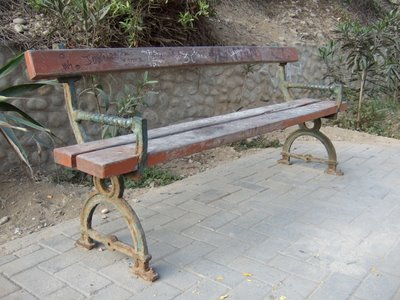
Particularly beautiful are the lines of wrought iron, sometimes curly and coquettish to form elaborate patterns as delicate as chantilly lace, sometimes spiky and stern to warn off intruders; oftentimes, all it takes is a few vertical bars and some horizontal ones placed in their proper proportions to frame the most utilitarian-looking electric meter box as if it was a priceless masterpiece.
Dogs in Lima sleep so it's the work of tall cacti, sturdy and prickly, to stand guard. Some cacti have only one arm and, while elegant, are not seriously threatening; I've seen cacti that wear such a heavy wig of branches that those drama queens are unlikely to be concerned with nonsucculent callers.
Lima has many pristine, well-coiffed homes; there are just as many once-glorious ones that contribute to the feeling that Lima is a city of rehabilitated ruins recently resuscitated. Though covered with graffiti, caked with dust, and crumbling with age, even a home in the most desperate condition has the power to present its simple lines, secret history, and subtle intelligence like an ancient king returned home.
Because many enclosed exterior spaces (such as patios) are tiled with ceramics that are similarly waxy, smooth, and lustrous, walking the streets of Lima feels very much like taking a stroll through a very large palace. Each shack, house, mansion, and tower is a room in this great palace.
The rooms in Palacio Lima are a collage of styles, colors, and textures. Wood, stone, iron, and glass are melted, sculpted, layered, and joined to form grand as well as intimate spaces.

Particularly beautiful are the lines of wrought iron, sometimes curly and coquettish to form elaborate patterns as delicate as chantilly lace, sometimes spiky and stern to warn off intruders; oftentimes, all it takes is a few vertical bars and some horizontal ones placed in their proper proportions to frame the most utilitarian-looking electric meter box as if it was a priceless masterpiece.
Dogs in Lima sleep so it's the work of tall cacti, sturdy and prickly, to stand guard. Some cacti have only one arm and, while elegant, are not seriously threatening; I've seen cacti that wear such a heavy wig of branches that those drama queens are unlikely to be concerned with nonsucculent callers.
Lima has many pristine, well-coiffed homes; there are just as many once-glorious ones that contribute to the feeling that Lima is a city of rehabilitated ruins recently resuscitated. Though covered with graffiti, caked with dust, and crumbling with age, even a home in the most desperate condition has the power to present its simple lines, secret history, and subtle intelligence like an ancient king returned home.
05 October 2006
jewel in the rough
My first full day in Lima, already I've sampled two alfajores. What is there not to love about Lima, about Perú?
Carlos waltzed me through central Lima to the Gran Hotel Bolivar and introduced me to the most famous pisco sours in the city. A friend of the hotel's general manager, celebrating the birthdays of two friends, shared his merriment and treated us to two more.
The drinks came in stoutish flutes, with short stems and simple geometry. The cocktails were a creamy sea green, topped with lathery white foam, and finished off with drops of anise-colored bitters; they tasted sweet, tart, strong, creamy, and a tad herbal from the bitters.
Our bartender, despite his wrinkle-etched face and 35-years in service, seemed youthful with his shockingly glossy black hair that I thought only existed in the imagination of anime artists.
¿Qué más? Hay mucho más.
Carlos waltzed me through central Lima to the Gran Hotel Bolivar and introduced me to the most famous pisco sours in the city. A friend of the hotel's general manager, celebrating the birthdays of two friends, shared his merriment and treated us to two more.
The drinks came in stoutish flutes, with short stems and simple geometry. The cocktails were a creamy sea green, topped with lathery white foam, and finished off with drops of anise-colored bitters; they tasted sweet, tart, strong, creamy, and a tad herbal from the bitters.
Our bartender, despite his wrinkle-etched face and 35-years in service, seemed youthful with his shockingly glossy black hair that I thought only existed in the imagination of anime artists.
¿Qué más? Hay mucho más.
Subscribe to:
Posts (Atom)



